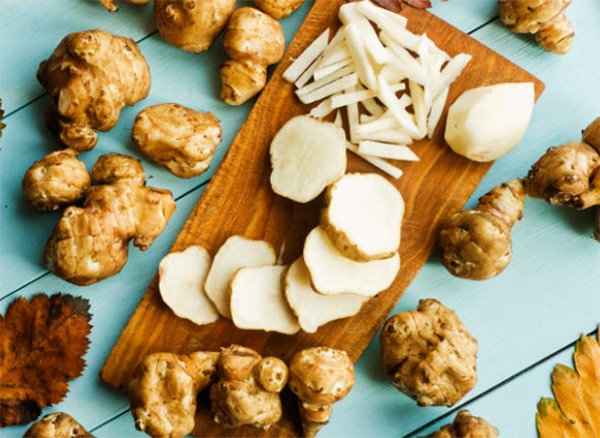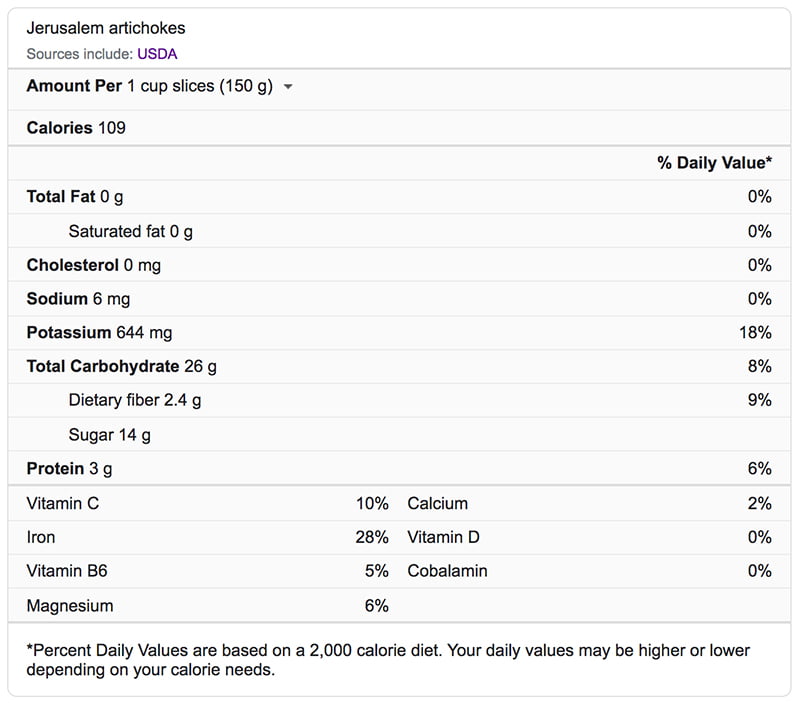Sunchoke, also known as earth apple, sunroot, and Jerusalem artichoke (Helianthus tuberosus), is neither native to Jerusalem nor a type of artichoke. They are a member of the sunflower family. Native to North America in the wild and cultivated farms, Native Americans enjoyed eating sunchokes for centuries that can date as early as 1603, according to The Oxford Companion to Food.
Jerusalem artichoke got its name from its association with early-world European settlers who thought they tasted similarly to artichokes and looked like girasole ("jeer-uh-SOLE-ay") or the Italian word for "sunflower."
What Is Sunchoke?
Sunchokes or Jerusalem artichokes are funny-looking light brown root vegetables that have recently gained attention at farmer's markets nationwide. Jerusalem artichoke tubers are very versatile, quick to cook, low in calories, low in carbohydrates, and high in fiber. It makes them a popular and desirable root vegetable to add to the dinner table.
With a delicate and artichoke-like unique flavor but look nothing like artichokes, Jerusalem artichokes are knobby vegetables that look very similar to ginger. And just like other ginger and other root vegetables, they have paper-thin skin and a creamy white interior.
What does sunchoke taste like?
Raw sunchokes have a sweet and nutty flavor like water chestnuts and jicama. Their unique taste and texture make sunchoke a fantastic addition to many foods, and they are a particularly great substitute for potato and other root veggies for people with diabetes.
What Are the Health Benefits of Sunchoke?
Packed in Vitamins and Minerals
Sunchokes are a great source of niacin, thiamine, vitamin B6, vitamin C, iron, calcium, magnesium, and potassium.
Antioxidant
Sunchoke has a small trace of antioxidants like carotenes. Combined with the vitamins, it can help scavenge harmful free radicals.
Packed with Inulin
Unlike most root vegetables, sunchokes store their carbohydrates as inulin instead of starch. Inulin is prebiotic, which means our digestive enzymes can not break down inulin, so it has a minimal impact on blood sugar and does not raise triglycerides. But it provides food for microbes in the intestines to encourage good gut flora.
The downside of inulin is that too much insulin can produce gas and bloat in sensitive people, and cooking sunchokes well can minimize this effect. And because of this reason, the Jerusalem artichoke has come to be known by another, darker name: the "Fartichoke."
High Fiber
Sunchoke is packed in both soluble and insoluble fibers! There are many health benefits when you consume dietary fiber. It includes promoting a healthy weight, reducing cholesterol, reducing constipation problems, adding bulk to the digestive tract, promoting blood sugar control, and so much more!
Low Calories
Even though sunchoke is sweet, it is low in calories. A 150g artichoke has 109 calories, which is lower in calories than a 150g potato.
Lower Glycemic Index
Sunchoke has a lower glycemic index score than potatoes, thanks to their starchy fiber that stops any spikes in blood sugar levels. This makes sunchoke an ideal sweetener for diabetics and dietetics.
Seasons/Availability:
In the United States, sunchokes (Jerusalem artichokes) are typically in their peak season from October to May. However, it's worth noting that the availability of sunchokes may vary based on the region and local growing conditions.

How to Cook Sunchoke/ Jerusalem Artichoke
Raw
Sunchoke can be eaten raw and can be served raw. They are the perfect addition to raw and fresh recipes. You can serve them along with your favorite vegetables and use them as healthy dippers. And because they do have a crunchy texture, some add them to a slaw. Raw artichoke will turn brown when it's exposed to the air, like an apple or sliced potato. To prevent this, you can put them in water or lemon water.
Roast
Sunchoke can be roasted like a potato. Toss them with olive oil and salt, roast at 425 degrees for 20 minutes, or slow roast at 325 to 350 degrees for about one hour to one and half hours until it's lightly caramelized and fork-tender.
Boiled
Bring a pot of lightly salted water to boil and place the sunchoke in. Cover and cook until crisp-tender. This process can take up to 10 minutes, depending on the size of your sunchoke.
Mashed
You can place boiled sunchoke and mash it with a masher. Add some salt and pepper, and it's ready to be served. You can mesh it as is or mash it with potatoes.
Pureed
You can place boiled sunchoke in a food processor and eat it in butter and cream.
Saute
To saute Jerusalem artichokes:
Slice them into cubes or slices.
In a large cast-iron skillet, heat up some olive oil and add in the Jerusalem artichokes.
Stir occasionally until they start to brown.
How To Select Sunchoke
When selecting sunchoke/ Jerusalem artichoke, look for smooth surfaces and firm tubers. Avoid sprouted, greenish colors, black spots, blemishes, or bruised roots. For less scrubbing and prep time, choose fewer knobby ones.
Particularly avoid sunchokes with wrinkles or browning of the skin as these signs can indicate that the sunchoke has reached a more mature stage. The older the sunchoke, the sponger they are, and it is not the yummy character you want.
How To Clean Sunchoke
Wash the tubers thoroughly in cold water with gentle scrubbing. The peel is perfectly fine to eat and can be peeled or not. If the Jerusalem artichokes are scrubbed well, peeling may be avoided. But if you would like to peel it, you can remove the skin with a vegetable peeler.
How To Store Sunchoke
To store Jerusalem artichokes (sunchoke) in the refrigerator, wrap the tubers in a paper towel and store them in the vegetable drawer. This method can help maintain their freshness for up to three weeks.
While edible tuber can be frozen or preserved through canning and pickling, it's important to note that these methods may result in discoloration and changes in texture, making them less than ideal-options.
For freezing Jerusalem artichokes, it's recommended to blanch them first. Start by briefly immersing the tubers in boiling water and then transferring them to ice water to cool rapidly. Once cooled, place the blanched tubers in an airtight freezer bag before storing them in the freezer. This blanching process helps preserve the quality of the tubers during freezing.

